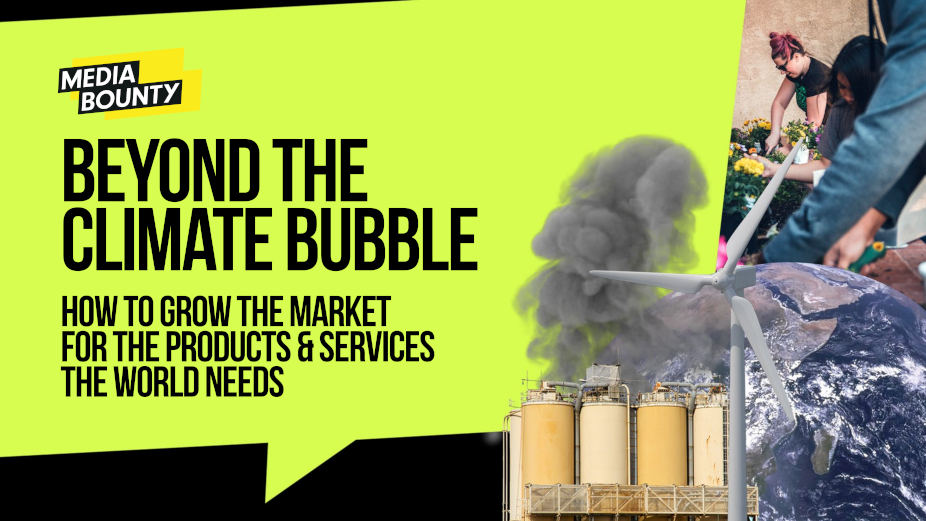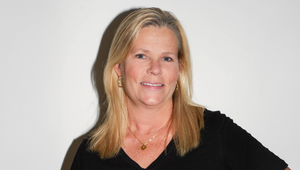
Why Brands Should Go Beyond the Climate Bubble

The recent report ‘Beyond the Climate Bubble’ by Media Bounty served up some sobering findings for the sustainability-minded in advertising.
Most green products are marketed at the 14% of people in the UK already very engaged on climate issues, it found. Brands are missing out on what the report calls the 'persuadables' – the 69% middle who believe climate change is happening, but aren’t taking much action to combat it.
Media Bounty worked with a cultural insights agency to run a three-month qualitative insights project into what the persuadables think about climate. Speaking to people in Birmingham, Newcastle and Yorkshire they learned that people are hesitant to go green because they are already under pressure; they've been cut out of the climate conversation (which is too London-centric, lefty and white); and they need impact they can see (people care about issues closer to home, like their families, communities and cultures.)
Based on the research and their industry experience, ACT Climate Labs created ten principles for how to appeal to persuadables with green products, giving examples of advertising campaigns which have been effective and why.
"As the co-author of this report, it's encouraging to see the interest it has gained in the advertising industry,” says Florencia Lujani, strategy director at Media Bounty. “If there's one thing I would like to share, it’s the motivation behind doing the research in the first place. A House of Lords committee found that to tackle climate change, one third of carbon reductions will need to come from consumers adopting low-carbon lifestyles.”
Sustainability Messaging Isn’t Mass-Market Enough
Everyone who responded to the report agreed that it was clear sustainability-centred marketing isn’t connecting with the majority of the British public. “This paper evidences what many in this industry suspected (and a cost of living crisis will no doubt amplify): Sustainability claims aren’t moving the masses,” says Tobey Duncan, head of planning at Uncommon.
Brands Have Focused too Much on Targeting a Climate-Conscious Elite
“Alongside features like superior ingredients, exacting manufacturing or intricate design, many brands treat sustainability as an opportunity for consumers to signal status (and for them to command a price premium),” says Oliver Egan, strategy partner at The&Partnership.
Caitlin Evans, strategy director at VaynerMedia EMEA agrees. “We need to stop perpetuating the message you’re not good enough to save the planet if you’re not a sacrificing climate activist or spending big on Insta-perfect cleaning products,” she says. “Brands need to move away from inflated campaign platforms, take real demonstrable action and talk to people on their level.”
The potential to shift behaviour and consumption away from what’s making Earth uninhabitable is a momentous challenge for the advertising industry. But, as Florencia at Media Bounty notes, “we won’t contribute to it if most advertising campaigns for sustainable products are targeting white, middle class, urban consumers; who already have a reusable mug, buy chemical-free cleaning products, or are about to switch to an EV.”
Amy Bowker, senior strategist at BMB Agency notes that many consumers are being ignored. “Many of them aren’t living in London, they’re not 21, and they don’t own a Keep Cup,” she says. “It’s our responsibility to make sustainability feel accessible to all – not a gen z kids’ club we didn’t get an invite to join. Our job is to position these products as cheaper, faster, cooler – to face up to the fact that sustainability isn’t everyone’s priority yet.”
In fact, it’s not even the priority that marketers assume it is. “It was brilliant to read such a clear and compelling report on growing sustainable brands,” says Amelia Markham, senior planner at Five by Five. “Advice on selling sustainability to an apathetic audience can be hard to come by – especially when we're so often led to believe that anyone under the age of about 25 is an eco-warrior willing to buy any product said to save the planet.
“At Five by Five we've recently conducted some research that shows that young people don't care all that much about the climate – at least not any more than anyone else. We found that when purchasing products they're much more concerned about the things that matter to them personally, like whether they can afford it. Which explains why so many of them shop at Shein rather than Reformation.”
Green Marketing Needs to Reach the ‘Persuadables’
“The ‘good news’ is that sustainability is coming home,” says Ben Essen, global chief strategy officer at Iris. “The climate is no longer an abstract future idea but an immediate and permanent fixture on today’s British calendar. So brands have many more chances to connect sustainable solutions to the things the persuadable 69% care about: neighbourhood and community, jobs, food, comfort and fairness.”
These 69% of British people need to be the first audience considered when it comes to marketing sustainable products. And the report’s ‘persuadables’ label is a clear idea that many strategists were in favour of. “I love the idea of the Persuadables,” says Jessica Lovell, founder and chief strategy officer at Wonderhood Studios. “It is a brilliantly clear way of talking about the majority of people – those who would be happy to switch to the sustainable choice, but don’t think that hard about it, or aren’t interested or passionate enough to seek it out.”
The message of brands driving more sustainable choices and behaviours needs to be broad and accessible. The&Partnership’s Oliver borrows a quote from pop culture authority Chuck Klosterman: “You don’t create a phenomenon like E.T. by appealing to people who love movies. You create a phenomenon like E.T. by appealing to people who see one movie a year.”
Managing director of The Liberty Guild, Aimee Luther, was fascinated by the report. “It acknowledges the ‘persuadable’ middle of UK society that are primed and ready to do their bit, on their terms. Because, whilst their planet is choking, the conversation about how to help seems to be passing them by. Their worlds, their towns, their high streets are further down the path of fuckdom. All most people can see from their doorstep is the closing of shops, dwindling community get-togethers, housing estates taking over farmland and a general sense of isolation. There are two ends of the spectrum of crises. At one end the planet on fire and, at the other, the very human need for community, stability and hope.”
The persuadables, of course, are not a monolith. “When it comes to sustainability, it is important to keep in mind that not everyone is on the same starting point,” says June Fong, strategy director at Dentsu Creative UK. “For many, sustainability is not yet a priority and there is an intention-action gap. Brands have a crucial role to play in bridging this gap. It involves altering well-established habits that have served people well for decades and rewiring that requires a consistent and committed effort. It is all about accessibility. Can we get people to understand why it matters and resonate as a personal truth? Can they see a reflection of themselves in the communications or is it reserved for an exclusive privileged group? Do we as marketers make it easy for them to take small, consistent actions? Ultimately, it is encouraging people to be more caring humans.”
Relevant Communication Is Key
“For a new narrative, we need new tools. The ‘Beyond the Climate Bubble’ report gives us these,” says Caitlin from VaynerMedia. These are varied and need to be used for the right audiences in the right way.
The report outlines a number of cultural codes, as Recipe strategist Jonny Pein points out: “Symbols and systems of meaning that are relevant to particular cultures that brands would be silly not to use if trying to appeal to a new audience.” For example, the report brings to attention that ‘Urban Somewhere in the North East’ feel a sense of pride in the place they come from or that ‘British Black & South Asian communities in Birmingham’ have a strong entrepreneurial spirit.
“These cultural codes are vital in creative communications because they allow brands to connect with their target audience,” he continues. “More specifically, cultural codes act as flags waving to their intended audience, encoded with the message ‘people like you, do something like this’. The more these codes show up authentically in a brand's advertising the greater the chance of creating strong connections with people from these cultures.”
After covid-19 hit, Lucinda Brooke, strategy director at The Upside, was one of many to up sticks from the capital and move back up north. Commuting every so often to London, she now spends most of her time based in a small village in South Yorkshire – sandwiched between farmers fields and old mining towns. “As a farmer’s daughter, I see first hand the tide of popular opinion and urban media turn against his livelihood,” she says. “Now blamed for not changing fast enough, it was not so long ago that his industry was actively heroed for producing more food, in more intensive ways.”
Communities like this need to be understood before brands have the right to speak to them. “These communities are open to change - try telling any different to my mum and her mates who rushed down to the local refill store on the day it opened. But, today, brands aren’t inviting them into the conversation,” says Lucinda. “Connecting with these communities around sustainability is not rocket science. Spend time with them, listen to their needs, see their complexities, become part of their communities, collaborate with who influences them.”
“It’s all the usual stuff. And, when growth depends on the spending power of these communities, it matters. But, up until now, it’s not been sexy or cool to look beyond the capital and I just don’t think most brands have really bothered. I hope they start to.
“As marketers we need to admit that the world we created around sustainable lifestyle is now our biggest enemy. While trying to preach to a smaller ‘relevant’ audience, we have excluded a significant mass who actually hold a greater power for change. Now brands have a massive job to disrupt the elitist perceptions they created around sustainability.”
Sustainability is relevant to all and brands need to reflect that. “In other words – and as applies to all advertising! – reach them with a message that’s relevant and that resonates and you’re well on your way,” says Amelia at Five by Five.
People Don’t Want a Lecture
“Moralising is missing the mark,” says Tobey at Uncommon. “Rather than letting the creative industry off the hook, this paper lays the challenge at our feet. This is a needed reminder that we must get better at turning widespread concern for the environment into action. The average modern consumer is both environmentally minded and unmoved by environmental lectures. The moral of the story is to look beyond the moral story. Vegan cookies needn’t be virtuous. Plant based meat needn’t be a protest. Green brands don’t need to grandstand.”
Bring the sustainability issue closer to home and down to earth, urges Ipeknaz Erel, senior planner at McCann London. “Instead of worthy, nebulous communications, brands need to think how they can bring sustainability within the day to day of a real person. A burning image of the planet might not be the best motivator for some, but protecting their land could be. They might be interested about Greta Thunberg’s next speech, but they sure would care about the future of their family and community.”
People Want to Act, but Brands Need to Make It Easy
‘Wishcycling’ is when you put something in the recycling bin hoping it can be recycled – but that actually can’t. As Piers Pollock, executive director, strategy and planning at The Gate London says, “We cheat, so desperate are we for the dopamine hit of acting for the planet. As the report points out so eloquently, the vast majority of us want to do right. But few have the self-discipline or zeal to engage enough to make the effort.”
‘Beyond the Climate Bubble’ provides tools for advertising to reframe thinking, with this in mind. “The challenge isn’t to force change,” says Piers. “It’s to make the adoption of new more climate-friendly behaviours effortless.”
The persuadables need the route to their climate-aware behaviour to be as frictionless as possible. “If they are going to be persuaded, then it needs to be without sacrifice. We need to be ready with an answer to the question ‘what’s in it for me?’ We need to recognise consumers aren’t going to want to compromise,” says Jessica from Wonderhood Studios. She put forward her own agency’s work for Karma Cola as an example, where the team recognised taste came first for a soft drink, followed by the ethical credentials of the brand.
“We saw this up close when relaunching Method,” explains Tobey at Uncommon. “They have become one of the world’s most ascendent green cleaning brands by swerving the guilt-trip and instead focusing on design. They’ve made sustainable cleaning so joyful, beautiful and desirable that it’s addictive. They’ve created the sustainable behaviour – not assumed it. In some ways Method bottles the lesson found in this paper. Businesses and communicators looking to save the world might need to get comfortable with the idea that sometimes people do the right thing for the wrong reasons.”
And It Needs to Be Affordable, Which Is Tricky
Persuadables need sustainable choices to be easy. “And they certainly don’t want to pay more – particularly in a cost-of-living crisis,” says Jessica.
For Andrew Gibson, chief strategy officer at Creature, the report reminded him of some words he heard at a barbecue a few years ago: “If something is cheap, someone else is paying.”
They’re words that he says highlight “a fundamental problem with this article – specifically on the notion of ‘ditching the green tax’. Most particularly, the implication is that consumers looking for more greener choices are being ‘taxed’ in some way. Rather, I think it’s the people making the cheaper goods who are being taxed – a higher price point for something ethically produced is simply what it costs to make something without exploiting someone.
“More than that, the idea that companies that prioritise and promote ethical production can also prioritise the long term and drop their prices is, to me, a significant reach. By definition most ethical producers are also small as this is the only way they can control their supply chain. Most likely this means that they are not in a financial position to prioritise the long term.
“So what can we do? Well, without fundamental change of the economic system, the idea of the advertising industry setting itself up to throttle demand (which seems to be the conclusion of the highly sensationalist ‘advertising adds an extra 32% to the annual carbon footprint of every person in the UK’ - which I’d encourage everyone to click on the source material for) simply isn’t tenable.
“But we could potentially look to shift that demand: We can make second hand sexy; we can meet small ethical brands where they are rather than preaching big-brand thinking at them; we can promote wearing something out or mending appealing as both a ritual and a badge.
“We can’t change economic systems and we can’t change human nature. But we’re very good at moving both around.”
Companies Need to Hold Up Their End of the Bargain
Aimee at The Liberty Guild notes that the companies’ footprints on the planet need to reflect their messaging if they want to be trusted. “Fully recyclable should be a base expectation. And the wrapper of brand around the product should live long after its physical host. A positive marketing legacy, that goes some way to keep home fires burning, communities tight and individual burdens shared.”
The report’s 10th action recommendation, ‘match hope with a concrete plan’ touches on something that resonates with Jo Weston, Wunderman Thompson London strategy director. The questions all brands need to ask go way beyond their comms: “‘What does a sustainable future look like for our business?’ and therefore ‘what products and services are we going to sell, to whom, how, where and why?’ to this end.”
Chief strategy officer at TMW Unlimited, part of Unlimited, Dan Bowers, agrees: “For many years brands have been built around artful storytelling, but it’s clear they now need to add substance to the story. They need to act with total honesty and commitment in delivering upon their sustainability strategies. It’s all very well jumping on the sustainability bandwagon; making an emissions pledge here, releasing a more sustainable product there. But for brands and consumers alike, ‘being sustainable’ will remain a half-hearted intention as long as we only do what we think we should be seen to do. Instead, brands need to embed a sincere sense of responsibility into their operations. That means loosening the shackles of short-term returns, and investing in serving and preserving a more progressive world for the long-term.
“It’s not up to consumers to raise the urgency of more sustainable living. People don’t have the time to check if claims are credible or authentic. They need to be able to trust brands are doing the right thing, which can be too easily eroded when brands are caught out greenwashing. Brands need more regulation and guidance around what is and isn’t greenwash to ensure they stay honest and transparent at all times. If brands get this right, it will build consumer confidence in the process and the market will grow as a result.”
Remember This Is About Stopping the Climate Crisis
Florencia from Media Bounty reflects on the bigger goals of the report she worked on: "I hope sustainable brands act on the recommendations of this report to make environmentally-friendly products the norm, and that they steal market share from their polluting competitors. I would love for my work to make good businesses more successful, helping them achieve long-term commercial growth while staying true to their purpose and values."















